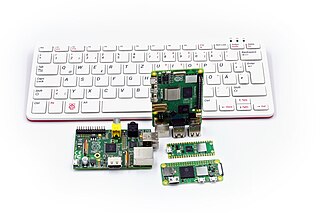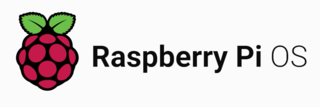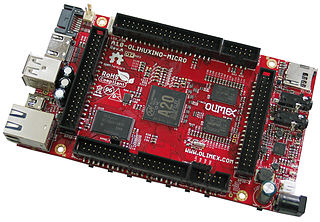In computing, cross-platform software is computer software that is designed to work in several computing platforms. Some cross-platform software requires a separate build for each platform, but some can be directly run on any platform without special preparation, being written in an interpreted language or compiled to portable bytecode for which the interpreters or run-time packages are common or standard components of all supported platforms.

Kodi is a free and open-source media player and technology convergence software application developed by the Kodi Foundation, a non-profit technology consortium. Kodi is available for multiple operating systems and hardware platforms, with a software 10-foot user interface for use with televisions and remote controls. It allows users to play and view most streaming media, such as videos, music, podcasts, and videos from the Internet, as well as all common digital media files from local and network storage media, or TV gateway viewer.

A digital media player is a type of consumer electronics device designed for the storage, playback, or viewing of digital media content. They are typically designed to be integrated into a home cinema configuration, and attached to a television or AV receiver or both.

The PandaBoard was a low-power single-board computer development platform based on the Texas Instruments OMAP4430 system on a chip (SoC). The board has been available to the public at the subsidized price of US$174 since 27 October 2010. It is a community supported development platform.

The Motorola Droid Bionic is an Android-based, 4G LTE-capable smartphone designed by Motorola. It was originally scheduled for release in Q2 2011 but was delayed, eventually being released on 8 September 2011.

Raspberry Pi is a series of small single-board computers (SBCs) developed in the United Kingdom by the Raspberry Pi Foundation in association with Broadcom. Since 2013, Raspberry Pi devices have been developed and supported by a subsidiary of the Raspberry Pi Foundation, now named Raspberry Pi Ltd. The Raspberry Pi project originally leaned toward the promotion of teaching basic computer science in schools. The original model became more popular than anticipated, selling outside its target market for diverse uses such as robotics, home and industrial automation, and by computer and electronic hobbyists, because of its low cost, modularity, open design, and its adoption of the HDMI and USB standards.

Bodhi Linux is a light-weight Linux distribution based on Ubuntu that uses an Enlightenment DR17-based fork called Moksha as its desktop environment. The philosophy for the distribution is to provide a minimal base system so that users can install the software they want. In turn, the distribution only includes software that is essential to most users, such as a file manager (Thunar), a terminal emulator (Terminology), and a web browser. To install additional software, Bodhi Linux developers maintain a browser-based app store that uses apturl to install programs.

Kivy is a free and open source Python framework for developing mobile apps and other multitouch application software with a natural user interface (NUI). It is distributed under the terms of the MIT License, and can run on Android, iOS, Linux, macOS, and Windows.

Nexus Q is a digital media player developed by Google. Unveiled at the Google I/O developers' conference on June 27, 2012, the device was expected to be released to the public in the United States shortly thereafter for US$300. The Nexus Q was designed to leverage Google's online media offerings, such as Google Play Music, Google Play Movies & TV, and YouTube, to provide a "shared" experience. Users could stream content from the supported services to a connected television, or speakers connected to an integrated amplifier, using their Android device and the services' respective apps as a remote control for queueing content and controlling playback.

Raspberry Pi OS is a Unix-like operating system based on the Debian GNU/Linux distribution for the Raspberry Pi family of compact single-board computers. First developed independently in 2012, it has been produced as the primary operating system for these boards since 2013, distributed by the Raspberry Pi Foundation.

OLinuXino is an open hardware single-board computer capable of running Android or Linux designed by OLIMEX Ltd in Bulgaria.

Banana Pi is a line of single-board computers produced by the Chinese company Shenzhen SINOVOIP Company, its spin-off Guangdong BiPai Technology Company, and supported by Hon Hai Technology (Foxconn). Its hardware design was influenced by the Raspberry Pi, and both lines use the same 40-pin I/O connector.

Salvius is an open source humanoid robot built in the United States in 2008, the first of its kind. Its name is derived from the word 'salvaged', being constructed with an emphasis on using recycled components and materials to reduce the costs of designing and construction. The robot is designed to be able to perform a wide range of tasks due to its humanoid body structure planning. The primary goal for the Salvius project is to create a robot that can function dynamically in a domestic environment.

Steam Link is a hardware and software product developed by Valve Corporation for streaming Steam content from a personal computer or Steam Machine wirelessly to a mobile device or other monitor. Steam Link was originally released as a hardware device alongside the debut of Steam Machines in November 2015. Valve discontinued the Steam Link hardware device in November 2018, in favor of supporting its software-based Steam Link application for mobile devices and smart televisions, as well as providing Steam Link as a software package for the Raspberry Pi microcomputer.

SolidRun is an Israeli company producing embedded systems components, mainly mini computers, Single-board computers and computer-on-module devices. It is specially known for the CuBox family of mini-computers, and for producing motherboards and processing components such as the HummingBoard motherboard.

Home Assistant is free and open-source software for home automation, designed to be an Internet of things (IoT) ecosystem-independent integration platform and central control system for smart home devices, with a focus on local control and privacy. It can be accessed through a web-based user interface, by using companion apps for Android and iOS, or by voice commands via a supported virtual assistant, such as Google Assistant or Amazon Alexa, and their own "Assist".

BubbleUPnP is a DLNA-compliant UPnP media controller, server and renderer, designed to allow streaming of audio or video from and to an Android device with various external devices and software. Alongside the Android client, it also has a server middleware application that can be installed on Windows, macOS and Linux computers or network storage devices, providing remote access through a web interface. BubbleUPnP also utilises ffmpeg and ffprobe for transcoding.
Orange Pi is a brand of single-board computers (SBCs) developed and manufactured by Shenzhen Xunlong Software Co., Ltd. in China. These computers are designed for educators and developers to tinker with electronics, learn programming, and build various projects.



















